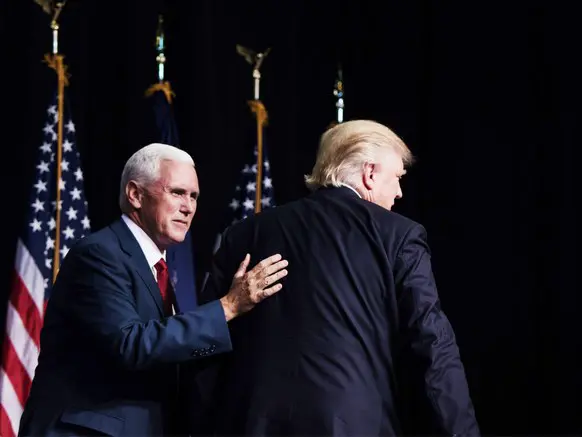YES, TONIGHT’S VICEpresidential debate sounds about as rousing as a lukewarm cup of Sleepytime tea. Mike Pence and Tim Kaine aren’t known for their colorful personalities, or known that much at all. (One recentpollfound that more than 40 percent of Americans can’t even name either vice presidential candidate). And why should anyone care? Vice presidents don’t have that much power anyway, right?
But the next vice president might. If Trump wins, Pence might end up running the show. And at least as far as Silicon Valley is concerned, that could be a big problem.
Wait, what? How could Pence pull off such a power grab?
The short answer is he wouldn’t even have to try. Vice presidents have become more influential since the early `90s, when President Bill Clinton entrusted major issues like protecting the environment to then-Vice President Al Gore. Since then, presidential nominees have started to see their vice presidents not as understudies but as partners, according to a newpaperfrom the Brookings Institution. Modern vice presidents usually have something they run on their own for the president, says Elaine Kamarck, who wrote the paper and worked for Gore. “They also have an ongoing relationship and the ability to be the last person in the room.”
As vice president, Kaine would likely follow in this tradition by assuming responsibility for domestic policy projects, especially given his experience in state and local government Kamarck says. (Kaine is a US Senator from Virginia, where he previously served as governor and mayor of Richmond.) But barring a tragedy—or someChris Christiefever dream in which Clinton actually gets indicted—it’s hard to imagine Clinton, a noted policy wonk, letting Kaine steer much of anything.
The same can’t be said for Pence, and that’s not just baseless speculation. When Trump was courting Governor John Kasich, it was clear the purported billionaire wasn’t interested in a VP who would remain in the shadows. One Kasich advisortoldThe New York Timesthat Donald Trump Jr. said his father’s pick would be in charge of domestic and foreign policy, leaving people wondering just what a President Trump would do besides issue tweetstorms.
For his part, Pence has remained deferential to his less politically experienced ticket-mate. He’s modest where Trump is, to use his own term, “braggadocious.” And unlike Trump,Pence is actually preparingfor his debate.
“I’m kind of the B-list Republican celebrity,” Pencetold supportersin Ohio last Wednesday. “I’m not the main event.”
But Pence’s self-deprecation may mask the promise of real power.
But how would Pence-as-shadow-president actually work?
The fact is, Trump would be the only president in history with no public service or military experience. So it’s not much of a stretch to assume that Pence, who served in the House of Representatives for twelve years and has been Indiana’s governor for three, might have a heavy hand in helping the new tweeter-in-chief navigate Washington.
“A President Trump would have to rely on someone,” Kamarck says. “Whether that is his vice president or whether it’s a powerful chief of staff, we don’t know.”
The role of a president’s advisors is to draft so-called “options memos” for the president, to present him or her with a series of decisions. But of course, a series of decisions go into drafting each memo, too, meaning the person who gets to shape those memos has an awful lot of power, Kamarck says.
“Presidents with deep experience in government can see right through this,” she says. “A president with no experience in government is at the mercy of the people surrounding him.”
If Trump becomes President, one of those people will be Pence. So while tonight’s debate won’t likely sway the election one way or another, it could help elucidate the potential policies of a Trump-Pence administration.
So what do we know about Pence?
Pence is perhaps best known for passing the so-called Religious Freedom Restoration Act in Indiana, which would have allowed businesses to deny service to people on the basis of their sexual orientation. Tech leaders like Apple’s Tim Cook and Salesforce’s Marc Benioff were among the high profile business leaders who spoke out against the law. Benioff evensaidthat Salesforce would suspend all business that required employees or customers to travel to Indiana if the law stood. (Pence signed a subsequent bill that asserted businesses could not use the act as cover to discriminate based on sexual orientation or gender identity.)
But that’s not the only piece of legislation over which the governor and the tech industry have disagreed. As a congressman in 2007, Pence voted against the Employment Non-Discrimination Act, which would have prohibited employers from discriminating on the basis of sexual orientation. Apple has supportedsimilarbut farther-reaching legislation.
Where does Pence stand on other issues the tech industry cares about?
Technologists broadly viewed the PATRIOT Act as anaffront to privacy rightsfor its expansion of government surveillance, but Pence voted to make it permanent in 2005. And while tech leaders haveralliedaround the same-sex marriage cause, Pence supported a proposedamendmentto the Constitution that would have defined marriage as being between a man and a woman.
His record on environmental issues is just as discordant with Silicon Valley’s values. While the industry’s biggest and richest leaders, including Mark Zuckerberg and Bill Gates, invest in clean energy technology, Pencesupportedbarring the Environmental Protection Agency from regulating greenhouse gasses, votedagainstputting enforceable limits on carbon dioxide pollution, andagainsttax credits for renewable energy creators.
There’s more. As tech companies like Netflix trot out generousparental leaveprograms, Pence votedagainstfour weeks of paid parental leave for federal employees in 2009. While the tech industryinvestsmillions of dollars lobbying to pass comprehensive immigration reform, Pence supports a border wall. He also activelyopposesnet neutrality.
Of course, given how tech leaders have overwhelminglyrallied around Clinton, Trump and Pence aren’t exactly courting Silicon Valley. Still with so much attention being paid to Trump’s every utterance, it seems just as important to watch what Pence says tonight. Pence’s words might be a little less meme-friendly. But if Trump wins, they could matter a lot.
(WIRED)
 简体中文
简体中文





